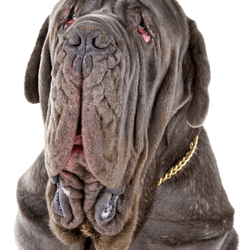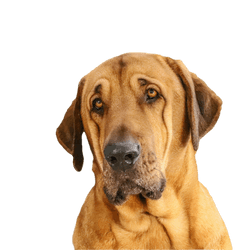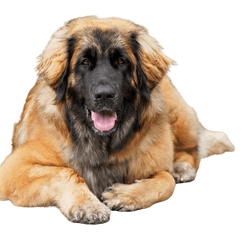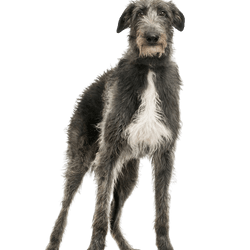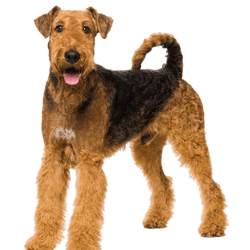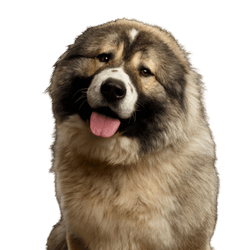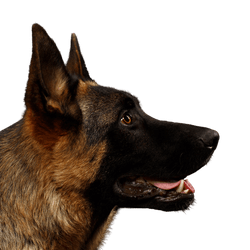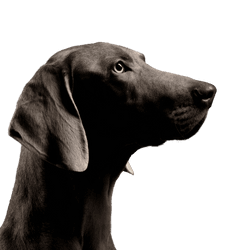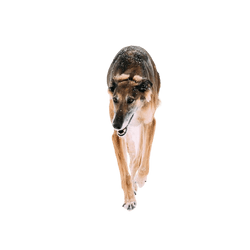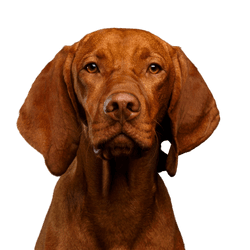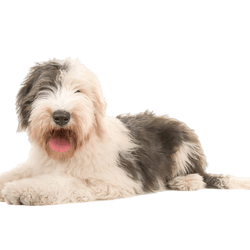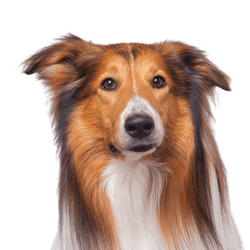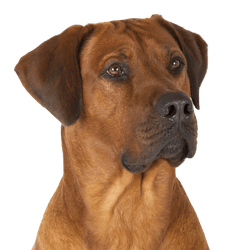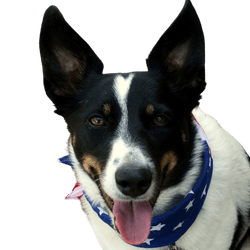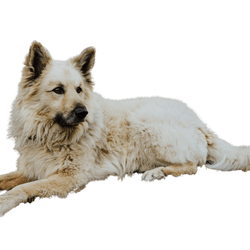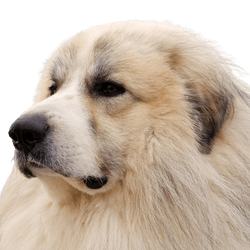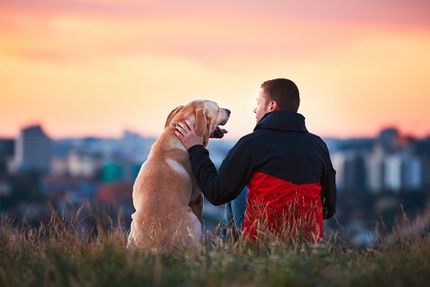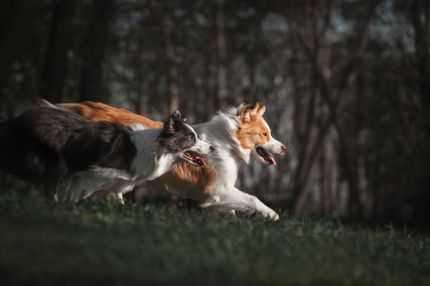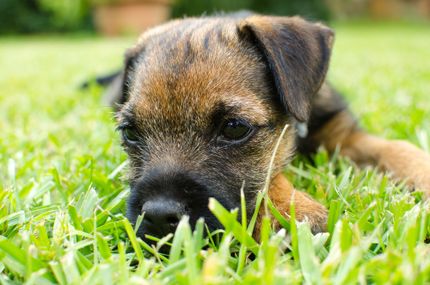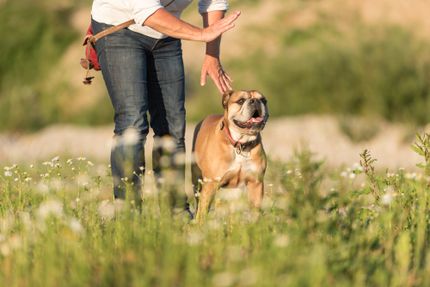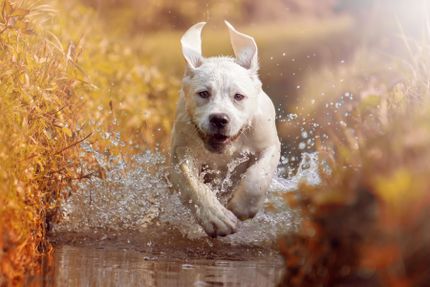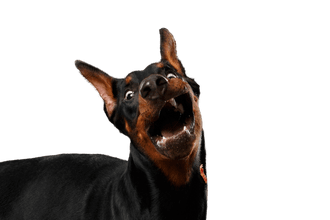
Dobermann Breed description: Character & Co
Dobermann
Facts & Origin
The Dobermann is an elegant, large dog with faithful-looking eyes and a distinctive appearance. When kept correctly, they are suitable as a multifaceted friend, sporty companion or as a loyal family dog.
The origin of the Dobermann
Back in the 19th century, a gentleman named Friedrich Louis Dobermann crossed aggressive "butcher dogs" with various types of hunting dogs. It was his clear intention to create a particularly sharp and attentive type of dog.
Later, he refined his breeding with Pinschers, Weimaraner hunting dogs, German Shepherds, Mastiffs and other mixed breeds that were locally known as particularly prone to biting.
Unfortunately, this negative start to the breeding of this dog still cause this actually peaceful breed it's bad reputation. Times have long changed and the once combative guard dog has become a lovable companion to active people.
The breed characteristics of the Dobermann
In earlier days, an aggressive appearance caused by their pointed ears and the docked tail were considered typical breed characteristics. But the image of the Dobermann has changed just as much as its appearance. Docking has long been forbidden. In some cases today you will even see specimens of this dog with gigantic ears and a merrily wagging tail.
Another trademark is the typical coat pattern in black or dark brown with reddish brown markings. The Dobermann is still considered an excellent watchdog as well as protection dog. At the same time it is just as likely to find the playful Dobermann alongside single people or as a family dog.
- good guard and protection dog
- at the same time lovable family dog
- used to be docked
- typical coat pattern in black or brown with lighter markings
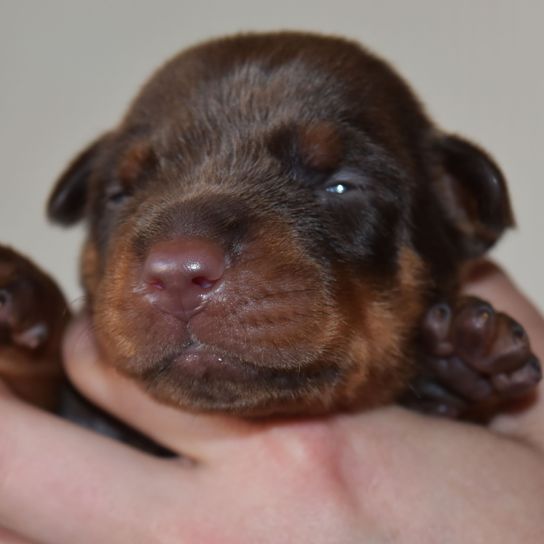
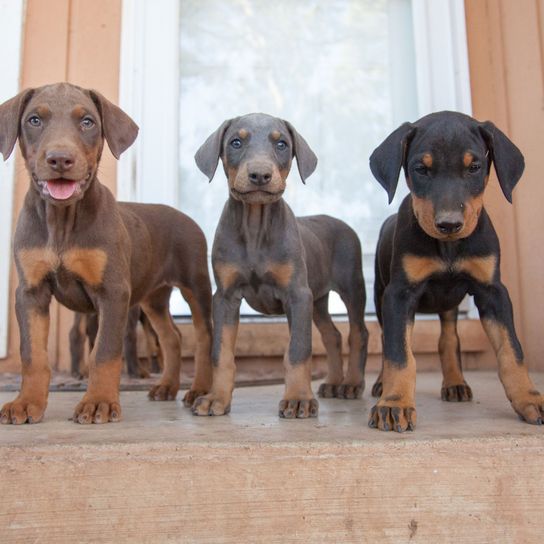
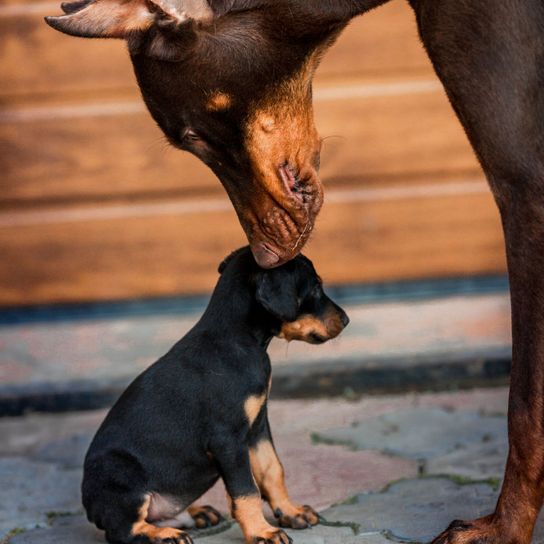
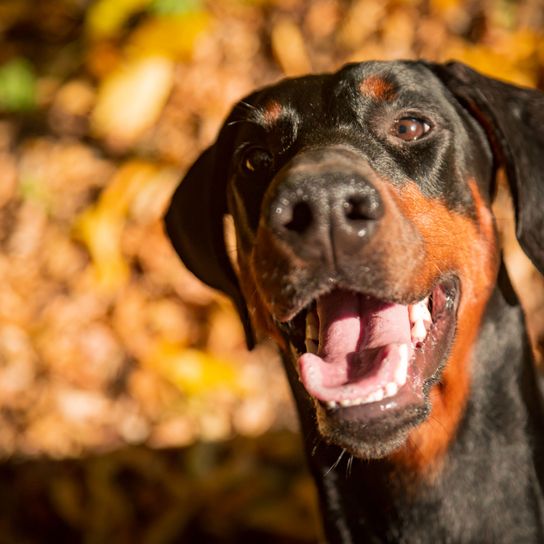
| Alternate Name | Doberman Pinscher, Doberman |
| Origin | Germany |
| Life expectancy | 10 - 13 years |
| Care requirements | low-maintenance |
| Activity level | average |
| FCI group | Pinscher and Schnauzer type |
| AKC group | working group |
| KC group | working group |
Dobermann mixes
Attitude, character and temperament of the breed
The typical character traits of the Dobermann
The sense of alertness has remained with the Dobermann. They can be very suspicious of others. Having said that, when they don't like someone, it will be with good reason. If you are good to your dog and train them correctly, they will never be unnecessarily aggressive or bite.
The Dobermann likes to be very playful, they love to go running with their owners or play around in water. Due to their extraordinary intelligence they are perfectly suited for demanding dog sports. You can do agility with them, tracking or complete the training as a companion dog with them. An appropriate amount of excercise and stimulation is important for this big sporty dog. A bored Dobermann can quickly develop bad habits.
- alert, sometimes suspicious of others
- loyal and intelligent
- wants to be challenged
- particularly suited for sporty people
Other things you should know about the Dobermann
In Brandenburg, the Dobermann is listed on the index. Regionally, it can be completely forbidden to keep a Dobermann or you might have certain conditions to comply to such as putting a muzzle on them or pay increased dog tax. This is regulated by independently in different areas. In Brandenburg, given you can provide proof that your dog is harmless, you will be immediately exempted from the regulations.
In Switzerland, the Dobermann is listed as a dangerous dog in nine out of twelve cantons. You have to get permission to be able to keep them. In the canton of Valais it is completely forbidden to own them.
If you live in Austria, you do not have to fulfill any special requirements for keeping a Dobermann. However, this only applies if your dog is peaceful and has not shown negative behaviour yet.
Character
Usage
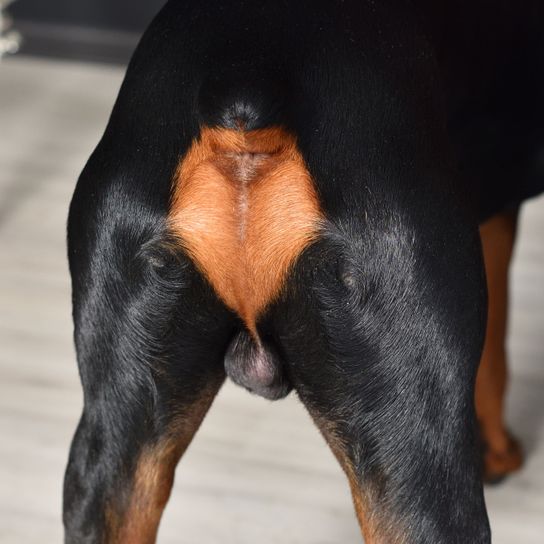
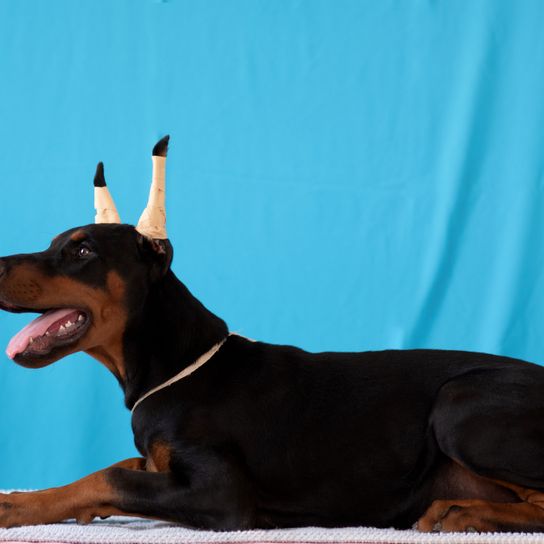
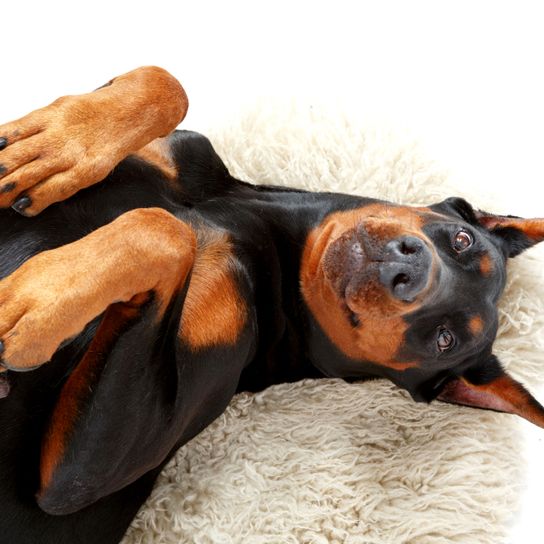


Health and breeding information
Typical diseases of the Dobermann breed
Hereditary diseases of the heart muscle, which used to be quite common, have now been greatly reduced by appropriate breeding selection.
Quite the similar thing happened in regards to hip joint dysplasia, which only occurs in exceptional cases now.
The Dancing Dobermann Disease is a rare nerve disorder, which only occurs in the Dobermann and other Pinschers. By temporary paralysis of whole muscle parts the dog walks in an unstable, dancing-resembling way. The disease is incurable, but can be easily delayed with appropriate therapy.
The Blue Dobermann syndrome is a rare genetic defect. The animals show the rare coat colours "Isabell" and "Blue". Even if these animals look very nice at first glance, the coat has clear defects. In the worst case, they lose all of their fur with increasing age. Carriers of this gene are excluded from official Dobermann breeding.
This list is completed by the hypothyroidism that occurs more often in the Dobermann.
- hereditary myocardial diseases
- Dancing Doberman Disease
- Blue Doberman Syndrome
- hip joint dysplasia
- hypothyroidism
Breeding and acquisition of a Doberman
If you want to buy a Doberman, you have to expect costs of up to 1.200 Euros for a healthy puppy including papers. You can recognise a good Dobermann breeding by the loving treatment given towards the animals and reasonably planned litters instead of pure mass reproduction.
Take a good look at the breeders and get them to show you the parent-animals too. Even if all Dobermann puppies seem funny and cute at first, inherited unfavourable behaviour can come through at a later age.
If you want to rescue a Dobermann, you should check your local animal shelter. In addition, Germany-wide protection associations, which exclusively take care of Pinschers and Dobermanns, offer grateful second-hand dogs.


Appearance and fur of the Dobermann
The Dobermann has a short, low-maintenance coat with the typical colouring and pattern of the breed. Their muscular torso is almost black, in rare cases can also be brown or dark brown. On the muzzle, the chest, the paws and on the hindquarters their fur is light brown or reddish.
Trademark of this breed is the elegant, slender head with its alert eyes. The muscular torso tapers clearly towards the waist and finishes elegantly in a long tail. Their back can sometimes be slightly bent, they have long legs and solid, broad paws.
The Dobermann used to have a docked tail and upright standing ears. The former is now no longer allowed and the latter has become rare.
Size, weight and life expectancy of the Dobermann
The Dobermann is a big, heavy dog. The shoulder height is at least 60 cm even in female specimens. In terms of weight, the bitches are much lighter than the more muscular males, weighing considerably less than 40 kg.
| Shoulder height | males: 65-72cm | bitches: 60-67cm |
| Weight | males: 40-45kg | bitches: 30-35kg |
| Life expectancy | 10-12 years | applies to both, of course ;) |
The Dobermann is often used in movies as a watchdog for the "rich" and has chased many a burglar in Hollywood movies across large estates.
| Fur length | short |
| Fur | flat coated |
| Ear shape | Floppy Ear |
| Tail | lang |
| Anatomy | strong, sporty, square |
| Size ♀ | 61 - 68 cm |
| Weight ♀ | 40 - 45 kg |
| Size ♂ | 66 - 72 cm |
| Weight ♂ | 32 - 35 kg |
| Suitable For | - |
Colors
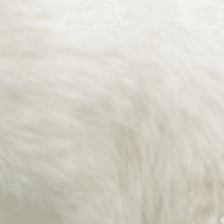
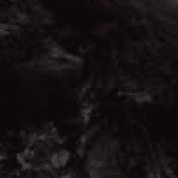

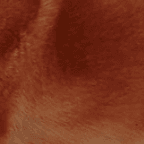
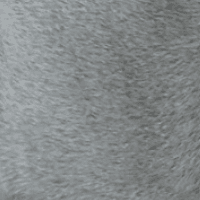
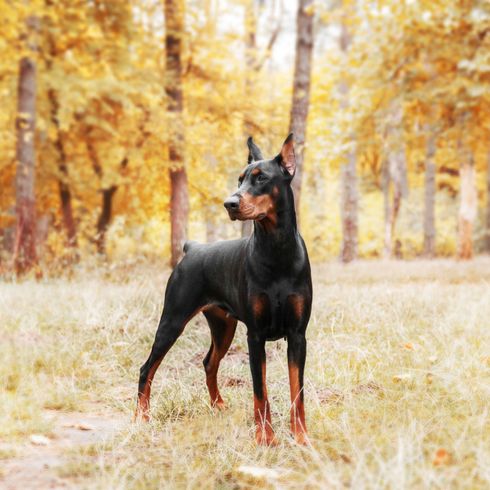
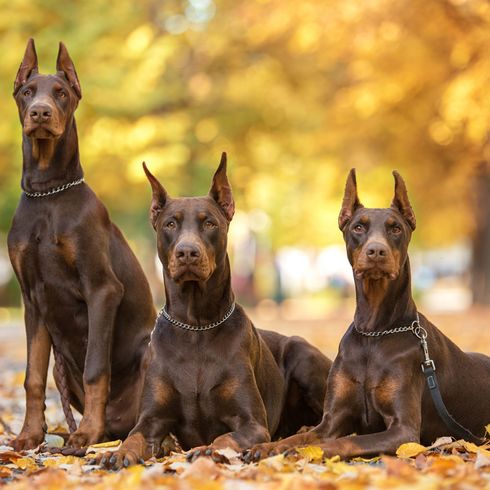
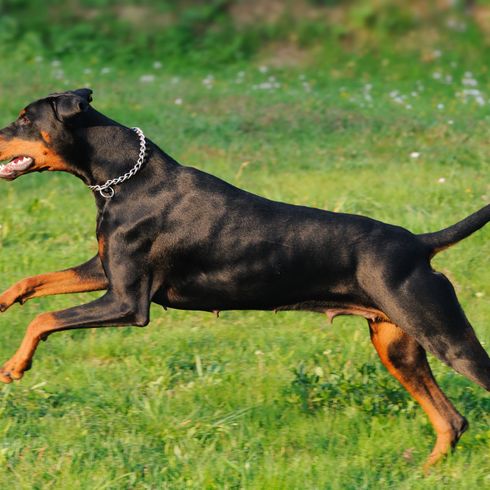
Known Diseases
Blue Doberman Syndrome
Blue Doberman Syndrome (Alopecia). This is a hereditary disease that leads to progressive hair loss.
Dancing Doberman Diseas
Initially, there is only bending of the legs, which is caused by muscle failure. In the advanced stage, the disease then leads to paralysis.
Heart disease
Can occur frequently in dogs and can sometimes be treated with medication.
Hip dysplasia (HD)
The hip dysplasia or hip joint dysplasia of the dog (HD) is a maldevelopment of the hip joint.
Hypothyroidism
Most often, dogs get sick in middle age. Causes of hypothyroidism. Several causes of hypothyroidism are known.
Ataxia
Ataxia (from Greek ἀταξία ataxia 'disorder' 'irregularity') is a generic term in medicine for various disorders of movement coordination. Ataxia can occur even when there is no paralysis (paresis), that is, when there is normal muscle strength.
Wobbler syndrome
In veterinary medicine, this is the name given to a complex of symptoms caused by nerve damage in the area of the spinal cord or spinal cord nerves in the area of the cervical spine.
FAQ
-
In principle it is not a fighting dog, but sometimes it is called such because it is on the list in some countries.
-
The Doberman is not considered a "command recipient" and wants to decide for himself, so the education is not so easy and you have to educate and train very affectionate and consistent. The Doberman is considered a listed dog in some federal states in Germany, Austria and Switzerland and is not to be classified as dangerous in principle.
-
A Doberman puppy costs about 2500 Euro. Special colors (which are not official colors) like blue or gray silver, cost significantly more.
-
Depending on education and training, the Doberman can also be a good family dog.
Sources and relevant links
Offizielle Seite des FCI
Accessed on 24.01.2023
Embark
Accessed on 24.01.2023
Gabriele Lehari (2004). Ulmers Großes Lexikon der Hunderassen. Ulmer.
Horst Hegewald-Kawich (2015). Hunderassen von A bis Z: Über 200 beliebte Rassen aus aller Welt. Gräfe und Unzer Verlag.
Other large dogs
Useful Articles
You can find articles that might interest you in the dogbible blog to match your favorite breed.
Visit our magazineto stay up to date on dog trends.
To find out more, view our Privacy Policy
Find here the breed that suits you and find out what character traits it has. Here you can also learn more about the origin, size and weight of your favorite breeds.
Matching your favorite breed, you'll find articles that might interest you on the dogbible dog blog.
Tattoos with dog theme: We have the cutest net finds for you
Allergy Dogs List: That Don't Shed





